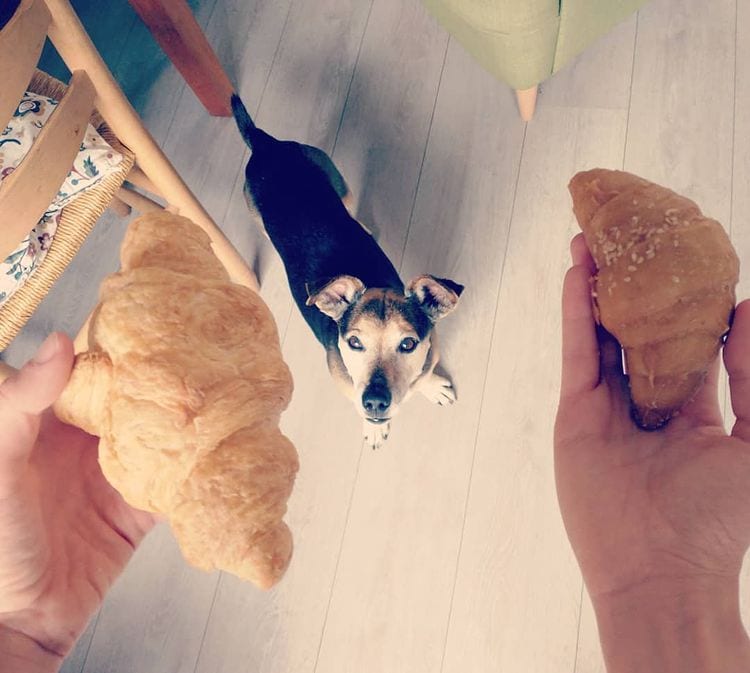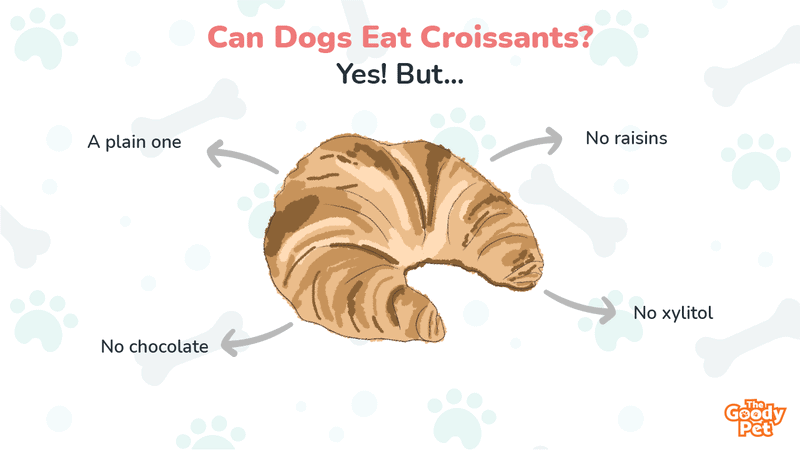Croissants are layered yeast-risen dough that is flaky and buttery. This description may appear scientific and complicated, but the plain reality is that croissants are among the many bread lovers’ favorite pastries. Of course, given that we know how much people adore croissants, it’s natural to wonder about dogs.
Has your pooch, despite your best efforts, sneaked a croissant from your countertop while you were away or when you weren’t looking? It’s important to know as soon as possible if your doggy has taken a small bite as it may cause them possible harm.
Dogs can eat croissants, but only in moderation and dependent on the ingredients used. While croissants are not harmful to your doggie, they do contain a lot of butter, which is unhealthy for them. A croissant containing raisins or xylitol, on the other hand, is deadly to your canine companion.
We’ll explain why croissants aren’t a healthy treat for dogs in this article. We’ll also go through which ingredients of the croissant are potentially harmful to dogs.
Is It Safe For My Dog To Eat Croissants?

If croissants don’t include toxic ingredients like xylitol or raisins, they are safe for your dogs to eat. Therefore, if your furry pet ate the croissant you left in the kitchen, you do not need to be concerned if there were no highly unsafe ingredients present.
Plain croissants can make your canine buddy sick if taken regularly. However, it’s a different story when:
- The dough is eaten without being cooked.
- Toxic ingredients have been added.
- They contain fillings.
What Are Croissants Made Of?
Eggs, yeast, butter, flour, sugar, and water are commonly used to make croissants. These are the essential ingredients for bread. In relatively small amounts, the majority of them are found to be safe for your dogs.
Croissants contain a lot of butter. Commercially produced ones range from 15% to 30%. In contrast, butter content in traditional and high-quality croissants can range from 40% to 80%.
Can My Dog Eat A Butter Croissant?
Dogs would not be harmed by eating a small bite of butter croissants. However, if they overeat, they may experience stomach discomfort and inconsistent bowel movements for a few days.
Fats are required in a dog’s diet. Essential acids, such as omega-3, are favored over saturated shortening acids. Croissants typically contain 22g of butter per serving. It’s also higher than the recommended daily fat consumption for dogs, which is only 21g.
What Will Happen After My Dog Ate A Croissant?

Canine pets may get complications ranging from vomiting to organ failure as a result of eating croissants. Dogs’ stomachs are frequently irritated by the high fat and dairy content, but long-term consequences such as weight gain and perhaps even pancreatitis might occur.
The following are some of the most prevalent signs of pancreatitis in dogs:
- Loss of appetite
- Vomiting
- Dehydration
- Lethargy
What Happens After My Dog Ate A Ham And Cheese Croissant?
A medium-sized ham and cheese croissant is enough to bring your dog to harm. Even though a serving of croissant isn’t very big, a few pieces together can trigger vomiting or stomach pain. This is due to the possibility that they include ingredients such as onions, which are toxic to dogs.
What Happens After My Dog Ate A Chocolate Croissant?
Even a single mouthful of a chocolate croissant could be deadly to your dog. Chocolate croissants should never be given to dogs. Its primary ingredient contains poisonous toxins that can kill your furry pet.
What Happens After My Dog Ate An Almond Croissant?
Allowing your dog to eat an almond croissant could result in choking or an allergic reaction. Almonds can build up and clog their organs if your doggie eats a lot of them, and they can also make it harder for your pet to breathe.
Puppies with small throats or intestines are more at risk. Although this variety of nuts contains no toxic elements, it is advised not to feed it to your pets.
What Are The Croissant Ingredients That Will Make My Dog Sick?
Dogs can be poisoned by raisins and xylitol, which can be found in croissants and other baked products. When consumed in significant amounts, each of these ingredients can induce poisoning, possibly causing seizures.
So if you enjoy sharing croissants with your pooch for breakfast, these two ingredients should be avoided.
Raisins
Pain aux raisins, or raisin bread, are harmful to dogs, despite how yummy they can be. Raisins are toxic for dogs who lack the enzymes needed for digestion, but they are safe for dogs who do. Given that you can’t tell if your furry pet is sensitive, it’s best to avoid raisin poisoning, which can lead to kidney failure.
The following are some of the most common signs of raisin poisoning in dogs:
- Loss of appetite
- Diarrhea
- Kidney failure signs
- Vomiting
- Dehydration

Xylitol
Xylitol, the most popular artificial sweetener, is extremely harmful to dogs. Xylitol causes seizures and a quick and dramatic drop in blood sugar levels, which can be deadly in some situations.
Since xylitol is a common ingredient in baked products, it’s critical to understand the symptoms of xylitol poisoning in dogs. The following are some of the most common xylitol poisoning symptoms in dogs:
- Diarrhea
- Vomiting
- Increased heart rate
- Jaundice
- Seizures
- Low blood pressure
What Are The Dangers Of Letting My Dog Eat A Croissant?
Fats are difficult for your dogs to digest, and excessive fat meals may cause a clogged duct from their gallbladder to their stomach. As a result, bile and pancreatic products may back up into their organs, causing pancreatitis.
Dangers, including pancreatitis, of letting your dog eat a croissant will be discussed in this section.
Stomachache
Milk fat is used to make butter. Though it’s not harmful to dogs, consuming too much of it can create stomach problems. This is due to the fact that the majority of dogs are lactose intolerant. Lactase enzymes are required to break down the sugars in milk.
When your doggies were younger, they had enough of it because it aids digestion of their mother’s milk. As your dogs grow older, their bodies generate less lactase, resulting in lactose intolerance. So, if your dogs have consumed a large amount of butter, they may experience stomach pain that lasts for days.
Food Allergy
Food allergies in dogs, such as to almonds, are possible. However, considering their sensitivity as well as the amount ingested, the effects will range from mild to severe. The following are some of the most common food allergy symptoms in dogs:
- Coughing
- Itchy skin
- Sneezing
- Having breathing difficulties
- Swelling
Pancreatitis
The most frequent cause of pancreatitis is fatty food. In the long run, this could cause inflammation in your dog’s pancreas, especially if they eat other oil-based food. When your dogs have pancreatitis, they will stretch their front legs forward while raising their hinds and keeping their head near the ground.

Alcohol Poisoning
Your dog may become lethargic and may also have a slow heartbeat after eating croissants. It can also lead to a heart attack. This is because as the dough rises, it releases not just gas but also alcohol, which can be poisonous to your doggie.
Dental Cavities
Powdered sugar is often found on top of almond croissants. As a result, this, along with additional glucose found in the other ingredients, may develop cavities in your dog’s teeth. These will then generate acids, which will destroy their enamel, the protective layer that covers their teeth.
Seizures
Harmful ingredients, such as chocolate and xylitol, may poison your furry pet’s body and can injure their nerves and brain. Hyperactivity and a rapid heart rate are the possible outcomes of seizures. Toxins may cause their heartbeat to beat twice as fast as usual.
Poisoning
Chemicals in chocolate croissants can improve a person’s mood. In the case of dogs, however, the situation is different. This is due to the presence of methylxanthines in cacao beans. These compounds are harmful to your canine pet since they are unable to digest them as well as humans who might lead to their death.
How Can I Make My Dog Stop From Eating Croissants?
It’s crucial not to panic if your dog ate your croissants or if you returned home to find a half-eaten croissant. Since stress impairs your ability to think, you must remain calm when faced with potentially dangerous situations.
In general, if you find yourself in one of the instances mentioned above, follow these procedures:
Prevent Further Access To Croissants
First, immediately remove any remaining food that your canine buddy might ingest. Make sure they can’t reach them. Next, look inside their mouth for any leftovers. After that, get them to drink a lot of water.
Monitor Your Dog
Keep an eye on your dog’s condition overnight and look for any of the symptoms given in this article. Some signs and symptoms can appear in as little as 30 minutes. Others could take up to 12 hours or longer.

Use Home-Based Treatment
Knowing what to do in an emergency like this could save your dog’s life.Activated charcoal is safe for dogs and is used to absorb any harmful toxins that have been consumed. Give this to your dog orally using a syringe, and you may repeat this every 4 to 8 hours.
Induce Vomiting
If it’s been 10 to 30 minutes since your dog last ate a croissant, vomiting may assist them in getting the poisons out of their body. However, if it’s already more than the given time frame, don’t try this.
Bring Your Dog To Vet
Describe the problem to your trusted veterinarian or the local emergency clinic. It’s vital to remain calm and clarify the scenario in detail once more. The more information you give the vet, the easier it is for them to decide what to do next.





